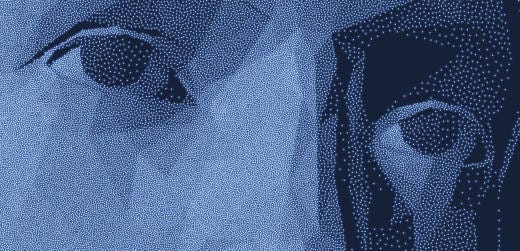On Aspects
aspect (n): a particular status or phase in which something appears or may be regarded
I remember as a child using binoculars for the very first time while on a hike in the foothills of Pasadena. Being excited at the novelty of being able to see eight, ten, even twelve times further than my naked eye, I stumbled around with them glued to my face like a pair of glasses, remarking at a bird soaring distantly through the air or a flower concealed in the foliage that otherwise have been impossible for me to see. I kept ambling forward, fully immersed in this new world until suddenly, my uncle grabbed my arm just before I was about to wander close to the edge of a fairly steep drop.
“Put those down, you need your eyes to see,” he said.
“I can see just fine with these,” I insisted, not wanting to part with this new-found sense of wonder, to which he replied firmly: “You can use them to look, but you need to see where you’re going.”
One of the greatest difficulties we face as a young generation navigating the modern era is the overwhelming amount of choice that we have, particularly in how closely we look at the world around us. Rather than accepting blindly what we are told to see, we may choose to inspect closely and questioningly, but in doing so, what once was simple and immutable wisdom is shattered into a thousand different aspects of right, wrong, and everything in between. Supposed truths that once appeared straightforward and unchanging on the surface can now be magnified to degrees often far greater than our capacity to understand, leading us to struggle with what to make of it.
These aspects often point in different and often confusing or conflicting directions, and the myriad perspectives that we constantly must make fit together, like a puzzle with far too many pieces, have convinced us that perhaps the picture of the truth, as well as the answers we seek from it, are paradoxically now even more elusive. Perceiving the world in higher definition did not change that we still see, through a glass darkly, not the whole but only in part, and some even argue that we were not meant to see beyond that which has always been fundamental. But the aspects of reality that have been revealed in our investigations are just as wonderful and mesmerizing as they are unsettling and paralyzing, and hint that our newfound vision, rather than a perplexing kaleidoscope, is actually both a microscope and telescope to visualize a better world.
It is critical, then, that we look, with clarity of mind, purity of intent, and humility of heart, at all the aspects of what lies now before us to form our views of what is good and right. The wisdom and counsel of those who have come before are useful filters by which we separate what has served well from what has not, but to ignore when such filters conceal truths that demand to be seen, or worse, to proceed blindly without having looked despite being equipped to do so, is a folly we cannot afford.
But the great power to see to greater heights and lower depths than those who precede us is not merely to further our own understanding. Our view of different aspects must provide us with carefully considered perspectives, and those perspectives must guide what we prospectively do. Our insight and foresight comes with a great responsibility - firstly to peer deep into the truths we find in order to chart paths yet untrod that lead the lost and oppressed to safety and comfort, and finally to paint a bright vision of the future, detailed enough to show the way to all who might seek it and vast enough hold the hopes and dreams of all who will inhabit it.
The future is difficult to predict and constantly changing, but dear friends, we may yet see the promise of a world far better than has ever been imagined. All we have to do is look.



